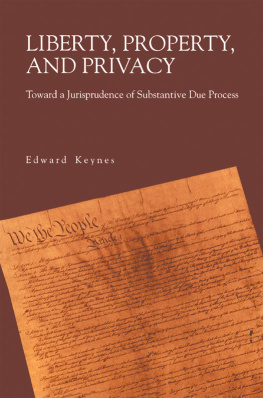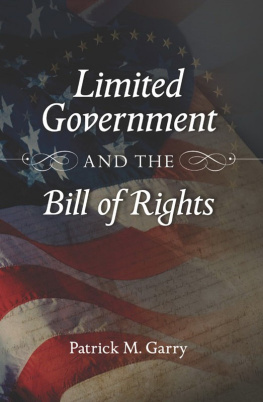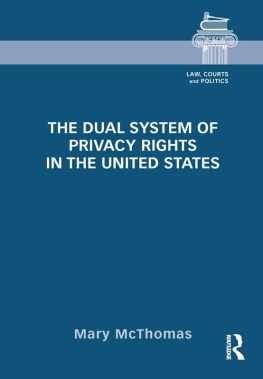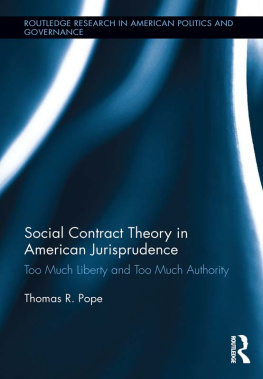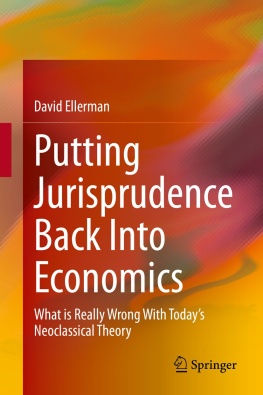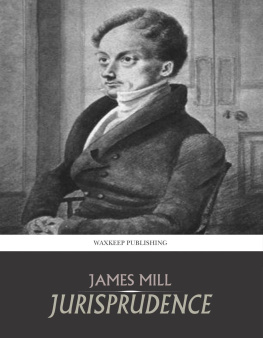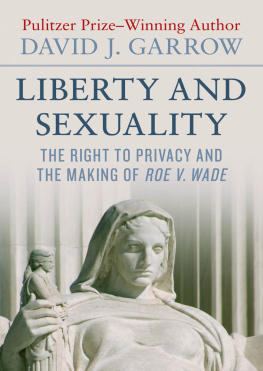Liberty, Property, and Privacy
Liberty, Property, and Privacy
Toward a Jurisprudence of Substantive Due Process
Edward Keynes
The Pennsylvania State University Press
University Park, Pennsylvania
Library of Congress
Cataloging-in-Publication Data
Keynes, Edward.
Liberty, property, and privacy : toward a jurisprudence of substantive due process / Edward Keynes.
p. cm.
Includes bibliographical references and index.
ISBN 0-271-01509-8 (cloth)
ISBN 0-271-01510-1 (paper)
1. Due process of lawUnited States.
2. Right of propertyUnited States.
3. Privacy, right ofUnited States.
4. Civil rightsUnited States.
5. I. Title. KF4765.K49 1996
347. 7305dc20 [347.3075] 9512709
CIP
Copyright 1996
The Pennsylvania State University
All rights reserved
Published by
The Pennsylvania State University Press,
University Park, PA 16802-1003
It is the policy of The Pennsylvania State University Press to use acid-free paper for the first printing of all clothbound books. Publications on uncoated stock satisfy the minimum requirements of American National Standard for Information SciencesPermanence of Paper for Printed Library Materials, ANSI Z39.481992.
For Josie, Marvin, and Their Family
CONTENTS
Although I cannot express my gratitude to all who contributed to this book, I want to thank my friends and colleagues Vernon V. Aspaturian, Evan Pugh Professor Emeritus; Trond Gilberg, Professor of Political Science at the National University of Singapore; and Werner Kaltefleiter, Professor of Political Science at the Christian-Albrechts University, Kiel, Germany, for their encouragement. I also want to thank the Alexander von Humboldt Foundation for its generous support, which has allowed me to complete this work and begin a new study. I also thank Larry Scaff for facilitating my sabbatical leave, which permitted the completion of this book.
The intellectual history of this book began in a joint seminar with my close friend and thoughtful critic Phillip E. Stebbins, Associate Professor of History at the Pennsylvania State University, to whom I owe a special debt. I am also indebted to my friends and former students Randall K. Miller and David L. Tubbs, who offered their suggestions for improving the manuscript. To James W. Ely Jr., Professor of Law and History, Vanderbilt University; Lewis Fisher, Senior Specialist, Congressional Research Service, Library of Congress; and Paul Kens, Professor of Political Science, Southwest Texas State University, a special thanks for their careful reading and thoughtful criticism of the manuscript. It is a great pleasure to publish again with Penn State Press, and to acknowledge the important role that Sandy Thatcher, director of the press, and Peggy Hoover, senior manuscript editor, played in publishing this book.
I thank my colleagues Deborah Cheney, Kevin Harwell, Helen Sheehy, and Ruth Senior of the Documents and Interlibrary Loan departments of the Pennsylvania State University Libraries for their continuing cooperation and professional assistance in completing the research for this book. Finally, I thank James L. Hollis, who contributed to this book by proofreading the manuscript, and Andreas Beckmann, who assisted in preparing the manuscript for publication. Of course, I assume responsibility for any errors that appear in this book.
Our Constitution is a covenant running from the first generation of Americans to us and then to future generations. It is a coherent succession. Each generation must learn anew that the Constitutions written terms embody ideas and aspirations that must survive more ages than one. We accept our responsibility not to retreat from interpreting the full meaning of the covenant in light of all of our precedents. We invoke it once again to define the freedom guaranteed by the Constitutions own promise, the promise of liberty.
Since 1965, U.S. Supreme Court decisions concerning marriage, the family, contraception, and abortion have kindled a national debate about the role of the judiciary in a democratic society. The Courts critics have argued that it is beyond the competence of the federal judiciary to make policy in these areas. The Courts advocates have responded that questions of marital privacy and reproductive liberty implicate constitutional rights that federal judges are eminently suited to decide. As the Supreme Courts decision in Planned Parenthood of Southeastern Pennsylvania v. Casey reveals, judicial intervention in the abortion controversy has evoked passions that will not die and that often obscure basic issues of jurisprudence and constitutional law that underlie the public debate.
Although this book examines the Supreme Courts role in a constitutional democracy, it is about the development of the fundamental-rights philosophy and jurisprudence that affords constitutional protection to unenumerated liberty and property rights. Since the 1880s diverse justices, including Stephen Field, Joseph Bradley, Rufus Peckham, James Clark McReynolds, John Marshall Harlan (II), and Harry Blackmun, have inferred unenumerated fundamental rights from the due process clauses of the Fifth and Fourteenth Amendments. Foremost among the Supreme Courts critics, Raoul Berger insists that due process is exclusively a guarantee of judicial fairness. The due process clauses ensure that the state and national governments cannot deprive individuals of life, liberty, or property, except by established judicial procedure. Berger and other proceduralists deny that due process imposes substantive limitations on the power of Congress and the
The thesis of this book is that due process includes a substantive as well as a procedural component. In the United States, due process is a guarantee against arbitrary governmental deprivation of life, liberty, and property. Although the due process clauses are a broad promise of liberty, they do not define the specific liberty or property interests that are encompassed. The due process clauses express the core substantive values that are the raison dtre of constitutional governmentthe protection of life, liberty, and property, but the framers of the Fifth and Fourteenth Amendments left the definition of specific liberty and property interests to Congress and the courts. Congress has the primary authority to define specific rights and remedies, but the courts can employ their power of constitutional review to restrain legislative deprivations of fundamental rights. This joint exercise of authority promotes a dialogue that inhibits both judicial overreaching and the abandonment of individuals rights to intemperate legislative majorities.
The language of the Constitution suggests that the due process clauses are conditional, rather than absolute, guarantees of life, liberty, and property. Neither the Fifth nor the Fourteenth Amendment was intended to frustrate the legitimate exercise of governmental authority to promote the publics health, safety, morals, or welfare. They were designed to prevent government from depriving people of fundamental rights without a justification rooted in the public interest. As a conditional promise of protection, the due process clauses require that a judicial arbiter decide in individual cases when public policy invades a constitutionally protected private realm that is beyond considerations of the public welfare.
Since the late 1880s the Supreme Court has flirted with substantive due process, sometimes affirming, at other times rejecting, the due process clauses as a restraint on the exercise of legislative power. Between 1897 and 1923 the justices employed due process to protect liberty of contract against various economic regulatory policies. After 1937 a new majority repudiated liberty of contract as a limitation on social and economic policy. Speaking for the Court, in 1963 Justice Hugo Black rejected the use of the Vague contours of the Due Process Clause to nullify laws which a majority of this Court believed to be economically unwise.

